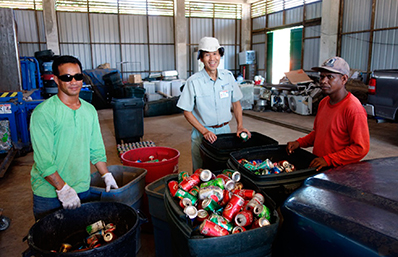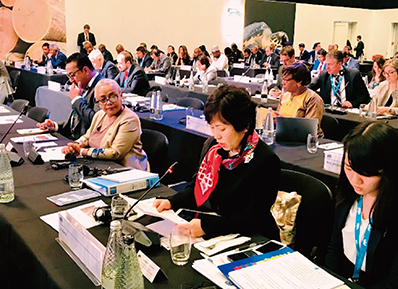(6) Environment and Climate Change Actions
Environment and climate change issues have been repeatedly taken up as one of the main topics at the G7/8 and G20 Summits, and the importance of tackling these issues has been increasingly recognized globally. These topics were also brought up in the Sustainable Development Goals (SDGs) adopted at the UN Summit in 2015. Japan has been vigorously working on addressing these issues, and will continue to actively participate in discussions in the international community.
■Japan’s Efforts
●Conservation of the Marine Environment

Employees of the Majuro Atoll Waste Company and a JICA Senior Overseas Volunteer sorting empty cans for recycling inside a recycling center built through the Grant Assistance for Grass-Roots Human Security Projects, toward the Marshall Islands. (Photo: Hideyuki Yamazaki, Grass-Roots Project Coordinator)
Marine plastic litter is a pressing issue that can have an adverse impact on the marine ecosystem, tourism, fisheries, and human health. In recent years, measures to address this issue have become increasingly important. At the G7 Charlevoix Summit held in June 2018, Prime Minister Abe spoke of the need for the world, including developing countries, to address this issue as a whole, and the necessity to promote measures such as “3R” (Reduce, Reuse, and Recycle) and capacity-building for waste treatment internationally. The Prime Minister further announced Japan’s commitment to tackle this problem at the G20 Osaka Summit held in 2019.
Furthermore, at the ASEAN+3 Summit Meeting held in November 2018, Prime Minister Abe proposed the “ASEAN+3 Marine Plastics Debris Cooperative Action Initiative,” which was supported by all the countries. This Initiative sets out the following: (1) Improve management of plastic waste by environmentally sound waste management and “3R” (Reduce, Reuse, and Recycle), (2) Promote awareness, research, and education on marine plastic debris, and (3) Strengthen regional and international cooperation. At the Japan-ASEAN Summit Meeting held during the same month, Prime Minister Abe also announced the expansion of support toward ASEAN’s countermeasures on marine plastic litter.
●Climate Change
Climate change is a global issue that requires a cross-border approach, and calls for strengthening concerted efforts by the international community including both developed and developing countries. Given the fact that the Kyoto Protocol adopted in 1997 imposed the obligations of reducing greenhouse gas (GHG) emissions only on developed countries, the Paris Agreement was adopted at the 21st Session of the Conference of the Parties to the UN Framework Convention on Climate Change (COP21), held in Paris in 2015, as a new framework under which all countries would work toward GHG emission reductions. The Paris Agreement entered into force in 2016. At COP24 held in 2018, the Talanoa Dialogue (a facilitative dialogue that means “transparency, inclusiveness, and harmony” in the language of Fiji, the presidency) was implemented to review the progress in global efforts toward reducing GHG emissions. The implementation guidelines for the Paris Agreement were also adopted with a view to the full-scale implementation of the Agreement after 2020. Moreover, with regard to finance for climate change related activities (climate finance), as of 2020, the respective countries affirmed that steady progress is being made toward the goal of providing $100 billion from developed countries to developing countries.
Japan is also steadily working to achieve its “Nationally Determined Contribution (NDC)”* to reduce GHG emissions by a level of 26% compared to FY2013 (down by 25.4% compared to FY2005) in FY2030, and is proactively engaged in promoting the development of innovative technologies in the fields of environment and energy, as well as actively supporting climate change actions in developing countries.
As part of this initiative, Japan has been promoting the “Joint Crediting Mechanism (JCM),”* which facilitates the global application of advanced low-carbon technologies. The JCM is a mechanism to evaluate Japan’s contributions to GHG emission reductions or removals in a quantitative manner and use them to achieve Japan’s emission reduction target through the application of low-carbon technologies and implementation of climate change actions in developing countries. In 2013, Japan signed the first bilateral document pertaining to JCM implementation with Mongolia, and to date, it has established the JCM with 17 countries as of the end of 2018. Since 2016, JCM credits have been issued from energy-saving and renewable energy projects in Indonesia, Mongolia, Palau, Viet Nam, and Thailand. These JCM projects have been contributing to the world-wide emission reductions.
In addition to these efforts, Japan also supports developing countries in the field of tackling climate change through its contributions to the Green Climate Fund (GCF).* A total of 93 projects have been approved by GCF to date. Since JICA and MUFG Bank were accredited as implementing entities in July 2017, it became possible for Japan to be involved in projects from the phase of project formulation.
●Biodiversity

State Minister for Foreign Affairs Toshiko Abe delivering a speech at the “Fourth International Conference on Illegal Wildlife Trade”
Expansion in the types, scope, and scale of human activities has given rise to serious concerns about further degradation of habitats and the destruction of the ecosystem in recent years. Japan places importance on biodiversity initiatives, such as hosting the 10th Meeting of the Conference of the Parties to the Convention on Biological Diversity (COP 10)* in Nagoya City, Aichi Prefecture in October 2010. With the aim of providing support for measures such as building the capacity of developing countries towards the achievement of the Aichi Biodiversity Targets,* Japan contributes to the “Japan Biodiversity Fund,” through which the Secretariat of the Convention organizes workshops to support the implementation of the National Biodiversity Strategies and Action Plans.
In recent years, illegal trade in wildlife, such as elephants and rhinoceroses, has become an increasingly serious issue. It is also drawing the attention of the international community as one of the sources of funding for international terrorist organizations. In October, State Minister for Foreign Affairs Toshiko Abe attended the “Fourth International Conference on Illegal Wildlife Trade” held in London, U.K., and with regard to measures for addressing illegal ivory trade, she expressed Japan’s intention to continue with the strict control of the domestic ivory trade, and to promote support for elephant poaching countermeasures in their range of countries.
●Environmental Pollution Control Measures
Japan has accumulated abundant knowledge, experience, and technology related to environmental pollution control measures, and has been utilizing them to solve environmental pollution problems in developing countries. At the “Conference of Plenipotentiaries on the Minamata Convention on Mercury” held in Japan in 2013, Japan took the lead in the adoption of the “Minamata Convention on Mercury” as the President (the Convention entered into force in August 2017). Japan will exercise continuous leadership in promoting the management of global mercury pollution by proactively transferring to the world its technology and know-how on preventing adverse effects caused by mercury, accumulated through its experience with the Minamata disease (Note 15). At the Second Meeting of the Conference of the Parties held in November 2018, Japan contributed to the smooth implementation of the meeting as the member of the COP Bureau (equivalent to the Board of Directors) representing Asia and the Pacific that leads the management and operation of the Convention. Japan, jointly with the EU, is also actively contributing to the international rules-making of mercury regulations, such as proposals on the specific standards for the scope and classification of mercury waste.
- *Nationally Determined Contribution (NDC)
- NDC refers to the GHG emission reduction target decided by each country itself based on the Paris Agreement Article 4, paragraph 2. The Paris Agreement stipulates that each party shall submit this every five years and take domestic mitigation measures to achieve its objectives.
- *Joint Crediting Mechanism (JCM)
- JCM refers to a mechanism to appropriately evaluate contributions by Japan for GHG emission reductions or removals in a quantitative manner through the diffusion of low-carbon technologies, products, systems, services, and infrastructure, as well as implementation of mitigation actions in developing countries and use them to achieve Japan’s emission reduction target.
- *Green Climate Fund (GCF)
- GCF is a fund established by the decision of the Cancun Agreements adopted at COP 16 in 2010, in order to support low-emission (mitigation) and climate-resilient (adaptation) investments in developing countries.
- *Convention on Biological Diversity (CBD)
- The CBD was adopted in 1992 due to the need to address biodiversity issues on a global scale as the issues related to living organisms are borderless. The objectives of the CBD are the following: (i) conservation of biological diversity, (ii) sustainable use of the components of biological diversity (utilizing living things, etc. for resources into the future while maintaining diversity at the levels of ecosystems, species, and genes), and (iii) fair and equitable sharing of the benefits arising from the utilization of genetic resources. Through the provision of economic and technical assistance to developing countries from developed countries, the international community as a whole facilitates the conservation and sustainable use of biological diversity worldwide.
- *Aichi Biodiversity Targets (The Strategic Plan for Biodiversity 2011 - 2020)
- Aichi Biodiversity Targets were set out in the Strategic Plan for Biodiversity 2011 - 2020 of the Convention on Biological Diversity adopted at COP10 in 2010. The strategic plan sets a goal to realize “Living in Harmony with Nature” by 2050, and established 20 individual short-term targets called the “Aichi Biodiversity Targets” in order to implement actions to halt the loss of biodiversity by 2020.
- Note 15:Minamata disease is a toxic nervous disorder caused by ingesting fish and shellfish contaminated with methylmercury compounds discharged from chemical plants. The disease was officially acknowledged in May 1956 in and around Minamata Bay area in Kumamoto Prefecture, and in May 1965 in Agano River basin of Niigata Prefecture.
